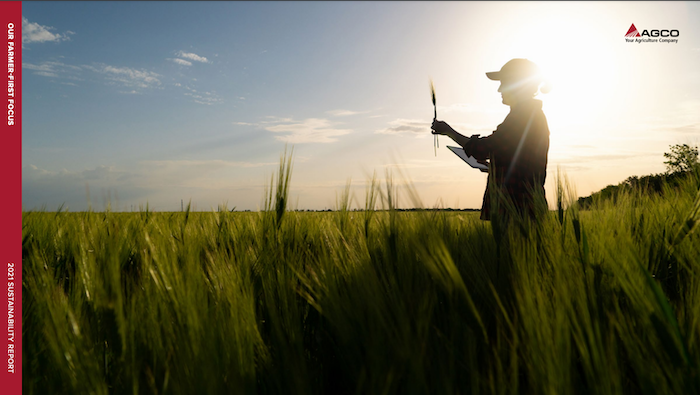AGCO’s latest sustainability report names the company’s precision agriculture investments, connected fleet and development of alternative-fuel tractors as progress toward its ongoing sustainability goals.
The company released its 2021 sustainability report on March 30, 2022. It’s a review of the company’s efforts to achieve the goals in its sustainability strategy, which was established in 2020.
“These early results have confirmed that our commitment to precision agriculture innovation places us on the right path to addressing sustainability,” says Eric Hansotia, chairman, president and CEO of AGCO.
Hansotia says AGCO launched 23 new precision ag products in 2021 and announced developments in targeted spraying technology using vision systems, artificial intelligence and machine learning. The targeted spraying developments include a collaboration with Robert Bosch, BASF Digital Farming and Raven Industries on evaluating spraying technology that can reduce crop inputs, and an equity investment in the precision spraying company Greeneye Technology. Hansotia says the company increased its research and development spending by more than $60 million in 2021.
AGCO successfully tested Xaver, the prototype autonomous row unit capable of planting corn, at its research Future Farm in Switzerland in 2021. The company says the row unit uses one-tenth of the energy of conventional farm equipment to perform the same task and substantially reduces emissions and compaction. The second iteration of Xaver was also demonstrated at a Fendt press event in Lake Geneva, Wis., in summer of 2021.
Eighty percent of AGCO’s production agriculture fleet retailed in 2021 is connected, according to the 2021 sustainability report. The report doesn’t define what qualifies as connected, but in general terms, connected equipment and its data can be remotely accessed and monitored.
More than 300,000 AGCO machines were connected as of 2021, which the company says is a 145% increase in its global connected fleet. The company’s goal is to deliver a 100% connected fleet by 2025. To achieve this goal, AGCO’s focus in 2022 is to hold the activation rate and expand proactive customer support that leverages data from connected machines.
The report says AGCO is incorporating more sophisticated sensors, technologies and cameras into products focused on communication, monitoring, sensing, tracking and controlling devices and systems. In 2021, AGCO acquired Appareo Systems, a software engineering, hardware development and electronic manufacturing company, and Precision Planting acquired Creative Sites Media, a software and app development company. AGCO is also investing in Apex AI, a software provider for mobility and driverless solutions.
“These investments have the potential to turn our brand portfolio of on-farm products into an active information network aimed at optimizing operations,” the report says. “These networks are also edging farms closer to capabilities for semi-autonomous operations, which will become critical to farmers facing the predicted worsening farm labor shortages.”
In 2022, AGCO plans to launch FendtONE, a consistent interface for the tractor and office. AGCO debuted the FendtONE operator interface in 2020. FendtONE has software tools for planning and organizing farm work processes, and the ability to view processes happening across the farm, some of which are based on data streaming wirelessly from the field. Managers can adjust equipment and processes in real time using FendtONE. Other people in the office, on the farm or on board the equipment can share the FendtONE view and manage tasks. Farmers can also use FendtONE software linked to a phone app to operate Xaver.
AGCO is also continuing development of the Fendt e100 all-electric tractor. The report says the e100 is currently in the advanced pilot stage and targeted for commercial launch before 2025. AGCO predicts the electric tractor has the potential for strong entry in livestock, specialty crops and municipality applications.
Fendt is also developing a prototype hydrogen-based fuel cell tractor. Massey Ferguson and Valtra are experimenting with a concept hybrid battery and combustion tractor, and Valtra is researching biomethane-powered tractors.
“We are making good progress in our development of low and zero-emission tractors, including the ongoing development of our Fendt e100 all-electric tractor,” Hansotia wrote in his CEO’s message. “We have furthered our industry leadership in the fuel efficiency of our equipment.”
Click here to read the full report.




![[Technology Corner] Helping Your Customers Determine Which Technology is Right for Them](https://www.precisionfarmingdealer.com/ext/resources/2025/03/26/Helping-Your-Customers-Determine-Which-Technology-is-Right-for-Them.png?height=290&t=1743084621&width=400)


